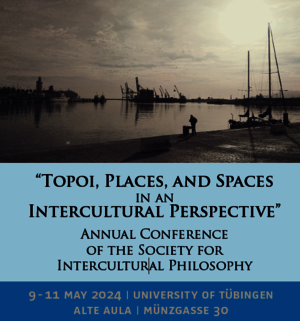AKTUELLES
GIP-Online Lectures
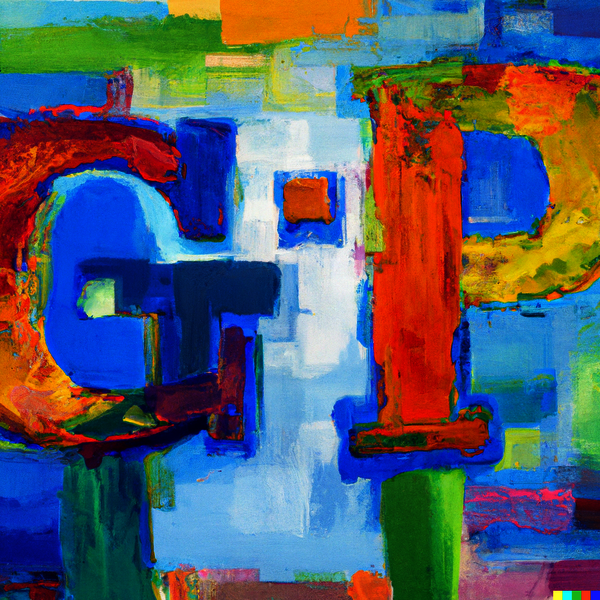
Dear members,
During 2020 the GIP launched a new lecture series. Given the serious situation of Covid-19 pandemic we would like to take advantage of the general necessity to communicate digitally. A digital lecture format allows members from all over the world to participate; also this gives us the chance to invite speakers from around the globe more easily. We very much invite all of you to join the monthly lectures and make this a forum for lively discussion!
2024
Tuesday, 23rd January 2024, 12 pm
Prof. Dr. Angela Roothaan, Philosophy, Vrije Universiteit Amsterdam, The Netherlands: „The Dynamic Web We Live In: Bantu Philosophy as Phenomenology of Human-Nature Relations”
Abstract und Bio anbei.
Tuesday, 6th February 2024, 12 pm
Prof. Dr. Lawrence Ogbo Ugwuanyi, Philosophy, University of Abuja, Nigeria: "The Ala Earth Ethics and Its Potentials"
Thursday, 11th July, 18:00.
Prof. Dr. Yohei Kageyama, Kwansei Gakuin University, Japan: „Kitaro Nishida with and against the Openness of the Phenomenological Concept of the World. Pure Experience, Place, Dialectical Universal.“Hybrid (Keplerstr. 2, rm. 003; online).
Wednesday, 24th July, 6 pm CEST
Prof. Dr. Arturo Escobar, University of North Carolina, Chapel Hill, USA: "Relationality, pluriversality, and care as foundations for ecosocial transitions."
To participate please send a short notice to niels.weidtmann@ciis.uni-tuebingen.de before the day of the lecture. The lecture will be given via zoom. A zoom-link will be sent to all those who registered.
Time: 7PM (Germany)
Following GIP-lectures will be announced shortly. For updated and more information about the past lectures HERE. GIP-lectures are organised by Dr. Niels Weidtmann, Dr. Anke Graness and Fernando Wirtz.
Stay healthy!
Niels Weidtmann, President
Deklaration zum G7 Treffen in Italien und zum Weltphilosophiekongre
The “Declaration on Philosophy and Interculturality” (informally known as “The Barletta Declaration”) was composed in response to an invitation from the G7 Summit in Italy to provide a document discussing some of the pressing philosophical issues facing the G7 nations (Canada, France, Germany, Italy, Japan, United Kingdom, United States) and the European Union. The Declaration was drafted in Barletta, Italy, over 23-24 May 2024, by a group of leading scholars who came to attend an International Philosophy Summit on the topic of “Conviviality and Dialogue among People.”
Read the statement HERE
Merck-Tagore Award: Honours Professor Dr. Ram Adhar Mall for promoting Intercultural Exchange
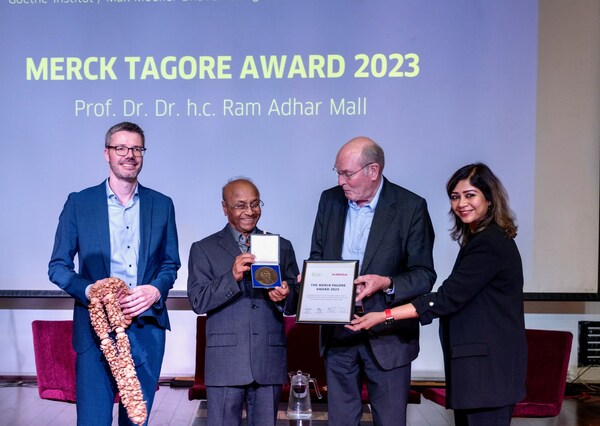
GIP congratulates its honorary president Dr. Ram Adhar Mall for this recognition.
"A pioneer of Intercultural Philosophy, Professor Mall was recognized for his contribution to the intercultural exchange between India and Germany. Professor Mall is the Founder and President of the global 'Society for Intercultural Philosophy' and serves as a co-editor for the publication 'Studies on Intercultural Philosophy'."
Statement zur Lage in Israel und Palästina
Mit großer Sorge und Betroffenheit hat der Vorstand der GIP die terroristischen Angriffe auf den Staat Israel wahrgenommen. Unser Mitgefühl und unsere Solidarität gilt allen Opfern der Gewalttaten und ihren Angehörigen. Unsere Hoffnung richtet sich darauf, dass in dieser schlimmen Eskalation, deren Ausmaße noch nicht absehbar sind, keine Zivilist*innen in Israel und Gaza mehr ihr Leben verlieren, dass elementare Grundsätze der Mitmenschlichkeit eingehalten werden und eine friedliche Lösung der jahrzehntealten Konflikte gefunden werden kann.
Vorstand, GIP
It is with great concern and dismay that the board members of the Society for Intercultural Philosophy (GIP) have been following the terrorist attacks on the State of Israel. Our solidarity go out to is with all victims of the acts of violence and their families. Our hope is that in this terrible escalation, the extent of which is not yet foreseeable, no more civilians in Israel and Gaza will lose their lives, that elementary principles of humanity will be respected and that a peaceful solution to these long-standing conflicts can be found.
Board members, GIP
Neue Schriftenreihe
Facetten gegenwärtiger Bildtheorie. Interdisziplinäre und interkulturelle Perspektiven, herausgegeben von Sergej Seitz, Anke Graneß und Georg Stenger ist als erster Band der neuen Schriftenreihe der GIP (Reihe interkulturelle Philosophie) vor Kurzem beim Springer-Verlag erschienen.
Annual Conference GIP
“Topoi, Places, and Spaces in an Intercultural Perspective”
WIENER FORUM 2024
Epistemische Gewalt, 16.-17. Februar 2024 (CLICK FOR MORE INFO)
Conference of the Society for Intercultural Philosophy (GIP e.V.)
“Topoi, Places, and Spaces in an Intercultural Perspective”
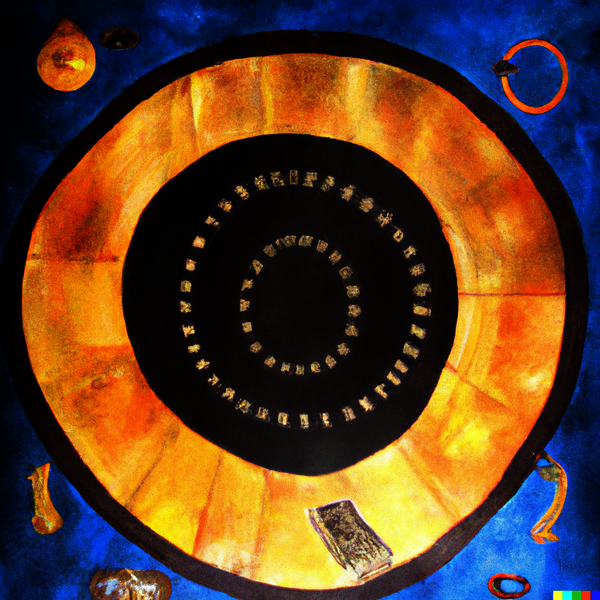
CALL FOR PAPERS
Annual Conference of the Society for Intercultural Philosophy (GIP)
“Topoi, Places, and Spaces in an Intercultural Perspective”
May 9-11, 2024
University of Tübingen
Languages: English
Deadline for submission of abstracts: January 31, 2024
The study and intercultural comparison of topoi, places, and spaces are of great importance for intercultural philosophy: (i) Intercultural thought itself can be described as a topographical one, building on European philosophy's stronger turn to space in the second half of the 20th century. (ii) Differently designed places and spaces may open up new and non-text-based accesses to other cultural life-worlds.
- While in the first half of the 20th century the focus of European philosophy was rather on reflections about time and temporality (Bergson, Husserl, Heidegger), the passage to the second half of the 20th century is accompanied by a shift from a focus on time to the relevance of topos and spatiality (Merleau-Ponty, Blanchot, Deleuze, Foucault, Derrida). Parallel to the new relevance of topos and spatiality in philosophy, the birth of structuralism and structuralist anthropology marks the 1960s, where the question of topos gains anthropological and cultural importance. To this topological interest comes the process of decentralisation. The backlash of postcolonial movements awakens national/indigenous self-consciousness as situated “we”. The way the Negritude movement marks the African thought in 1960s and 1970s shows strongly the necessity of “other locations from which thinking could start” (Eboussi Boulaga). Comparable philosophical thematization of topos and location of thought have also been outlined in other geographies and languages, as for example in the Arabic speaking world (Abed al-Jabri). The process of decentralisation is an important counterpart of the cultural turn. If the homogeneously imagined and measurable space is the signum of modernity and its idea of globality, we are currently experiencing a return to a multiplicity of situated forms of life and lived spaces. This is strongly being discussed in anthropology (e. g. in the so called "ontological turn": Viveiros de Castro, Descola, Holbraad) and in relation to the critique of the nature-culture divide in literature and science & technology studies, feminist theory, and critical posthumanism (Butler, Haraway). However, these approaches often lack an eye for the historical depth and intellectual-historical significance of the respective spaces, including the homogeneously imagined space of modernity. This highlights the importance of interdisciplinary exchange on these issues.
- Images and artworks, as well as architecture and even landscapes, provide a unique access to cultural traditions and their thinking. Watsuji`s famous study on climatic influences on humanity is an early example for this, but also with respect to arts and architecture this has already been shown (latest by Descola in his Les forms du visible) – and particularly well so with reference to East-Asia (Suzuki, Ohashi, Obert). However, the relational structure of spaces and places to cultural traditions becomes relevant also the other way around. This is most obvious with respect to environmental issues. In environmental studies non-Western approaches become more and more relevant. This is true with respect to the acknowledgement of Amerindian epistemologies already mentioned above but it is also the case with respect to African epistemologies which raise inspiring alternative paths of thought. Finally, eco-phenomenology (Toadvine, Brown), rhizomatic and nomadic thinking (Deleuze & Guattari), and religious studies contribute to the discussion of lived spaces.
However, these different strands of thought have so far hardly been brought together and made fruitful for intercultural philosophy. We would like to make up for this with our conference.
Abstracts for presentations of 20 min are invited for one of the following six sections:
- Dwelling, Belonging, and Phenomenology of Spatiality
- Nomadic Thought, Imaginary Geography, Utopia and Dystopia
- Aesthetics, Architecture, and Landscapes
- Knowledges of Ecology
- Decoloniality and Global History
- Religious Places and Spatiality in Religion
Please send an abstract of 500 words max. to abbed.kanoor ( AT ) ciis.uni-tuebingen.de. Deadline is January 31st 2024. Please indicate in which section you would prefer to speak. Please also send a short bio. Successful applicants will be notified by early February.
The conference is planned as a face-to-face event with some hybrid components.
PD Dr. Niels Weidtmann
Society for Intercultural Philosophy (GIP)
President
University of Tübingen
Wiener Forum interkulturellen Philosophierens 2023
Autoritarismus und interkulturelle Philosophie
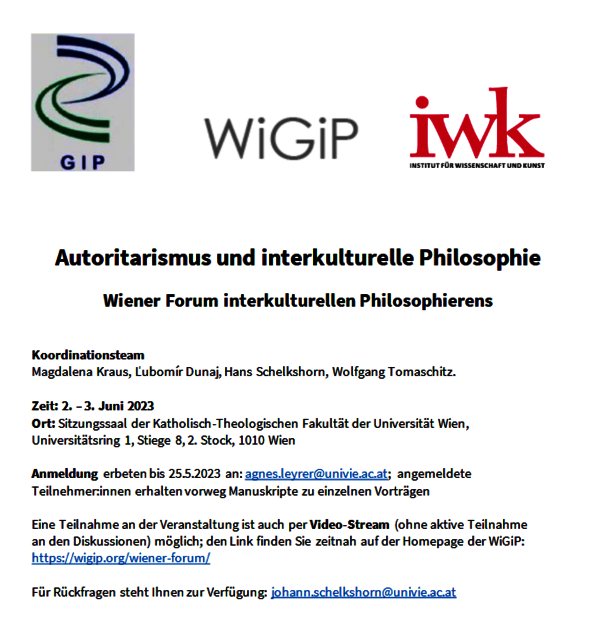
Programm HIER
Über die Lage in der Ukraine
On the Situation in Ukraine
Die GIP ist erschüttert vom Angriffskrieg Putins auf die Ukraine. Wir fordern Putin dazu auf, den Krieg sofort zu beenden und alle Truppen aus der Ukraine zurückzuziehen. Die staatliche Souveränität der Ukraine und der Frieden in Europa müssen geachtet werden. Wir solidarisieren uns mit dem ukrainischen Volk, aber ebenso mit den vielen Menschen in Russland, die den Krieg ablehnen. Die GIP solidarisiert sich insbesondere mit den russischen Wissenschaftler*innen, die in einem offenen Brief gegen den Krieg protestieren.
Brief auf Deutsch:
Brief auf Russisch
https://trv-science.ru/2022/02/we-are-against-war/
The SIP is shocked by Putin's war of aggression on Ukraine. We call on Putin to end the war immediately and withdraw all troops from Ukraine. Ukraine's state sovereignty and peace in Europe must be respected. We stand in solidarity with the Ukrainian people, but equally with the many people in Russia who reject the war. The SIP is in particular solidarity with the Russian scientists who protest against the war in an open letter
Letter in German:
In Russian:
https://trv-science.ru/2022/02/we-are-against-war/
Die Gesellschaft für Interkulturelle Philosophie (GIP)
Die Gesellschaft für Interkulturelle Philosophie (GIP) wurde 1992 als gemeinnütziger Verein gegründet und hat inzwischen Mitglieder in allen Erdteilen, die gemeinsam an der Sache der Interkulturellen Philosophie arbeiten. Es gilt die engen Schranken der eigenen kulturellen Bedingtheiten im Philosophieren zu öffnen und sich sowohl systematisch als auch historisch im gegenseitigen Austausch mit den philosophischen Bemühungen anderer, zunächst fremder Kulturen auseinander zusetzen.
Die GIP und ihre Schwestergesellschaften veranstalten zu diesem Zweck regelmäßig Tagungen und Kongresse; außerdem wird die Diskussion in zahlreichen Publikationen geführt. Die Mitglieder der GIP bemühen sich darüber hinaus, das Anliegen der Interkulturalität in Vorträgen, in Forschung und Lehre und in Diskussionsrunden bekannt zu machen. Gesprächskreise finden auf regionaler Ebene statt.
Interkulturelle Philosophie versteht sich nicht als eine Philosophie innerhalb einer jeweils bestehenden Philosophie. Vielmehr begreift sich diese Art des Philosophierens als methodologischer Standpunkt, mit dem eine Annäherung aller Weltphilosophien untereinander ermöglicht werden kann. Betont werden die unterschiedlichen Wege, durch die Menschen seit je her versuchen, sich selbst und die Welt gedanklich aufzunehmen und lebenspraktisch zu gestalten. Daher macht sich Interkulturelle Philosophie stark für eine Ausweitung des Blickes. Es gilt, unterschiedliche philosophische Standpunkte systematisch zu erforschen und mit einander in Verbindung zu bringen, ohne diese zu essentialisieren bzw. auf einige wenige zu reduzieren. Dabei redet Interkulturelle Philosophie weder einem Kulturrelativismus noch einer Indifferenz das Wort. Eher steht die ethische Haltung im Mittelpunkt, mit der eine gemeinsame friedliche, gerechte Zukunft erzielt werden kann.
Intensive Sprach- und Quellenstudien gehören daher ebenso zu den Aufgaben der interkulturellen Philosophie, wie das Herausbilden einer Hermeneutik interkultureller Verständigung. Hier werden in hermeneutischer, dekonstruktiver, spekulativer, dialektischer, etc. Gestalt Methoden und Wege der Annäherung ebenso untersucht wie die je unterschiedlich ausdifferenzierten Modelle und Systeme anthropologischer, logischer, staats- und rechtsphilosophischer, ästhetischer, religionsphilosophischer oder metaphysischer Art.
